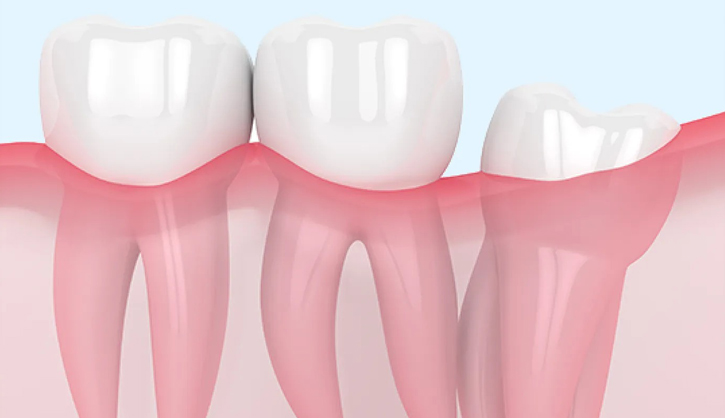
What occurs following the extraction of your wisdom tooth?
After surgery, please follow these instructions promptly.
- Keep the gauze pad over the surgical area for 30 minutes, then remove and discard it.
- Avoid vigorous mouth rinsing or touching the wound to prevent dislodging the blood clot and causing bleeding.
- Take prescribed pain medications when you start feeling discomfort, usually when the local anesthetic wears off.
- Rest on the day of surgery and resume normal activities when you feel comfortable.
- Apply ice packs to the sides of your face where surgery was done to reduce swelling.
Bleeding
Swelling
Pain
For mild to moderate pain, you can take one or two tablets of Tylenol or Extra Strength Tylenol every 3-4 hours. Alternatively, you can take Ibuprofen (Advil or Motrin) instead of Tylenol. Ibuprofen over the counter comes in 200 mg tablets, and you can take 2-3 tablets four times daily, not exceeding 3200mg daily for adults. Please consult our practice for individuals under 18. Do not take both medications at the same time.
For severe pain, take the prescribed medication as directed. Do not take any of the above medications if you are allergic to them or if your doctor has advised against it. Avoid driving or operating machinery, and refrain from consuming alcoholic beverages. Pain following surgery should gradually improve each day. If pain persists, seek medical attention by contacting our office.
Diet
After receiving general anesthetic or IV sedation, it is important to only consume liquids initially. When drinking, use a glass and avoid using straws as the sucking motion can dislodge the blood clot and cause more bleeding. Soft foods can be eaten by chewing away from the surgical sites. It is crucial to have a high calorie, high protein intake for proper healing. Our staff can provide you with diet instructions to follow. Regular nourishment is essential to prevent dehydration, so be sure to take fluids regularly. Since your food intake will be limited in the first few days, increase your fluid intake to at least 5-6 glasses daily. Do not skip meals as maintaining a regular eating schedule will help you feel better, have more strength, experience less discomfort, and heal faster.
CAUTION: When transitioning from a lying position to sitting or standing, be cautious as you may experience dizziness. If you have been lying down after surgery, take a minute to sit up before standing to avoid feeling lightheaded.
Keep the mouth clean
Discoloration
Antibiotics
Nausea and Vomiting
Other Complications
- If numbness of the lip, chin, or tongue occurs there is no cause for alarm. As reviewed in your consultation, this is usually temporary in nature. You should be aware that if your lip or tongue is numb, you could bite it and not feel the sensation. Call Dr. Khayat if you have any questions.
- Slight elevation of temperature immediately following surgery is not uncommon. If the temperature persists, notify the office. Tylenol or ibuprofen should be taken to reduce the fever.
- You should be careful going from the lying down position to standing. You could get light headed from low blood sugar or medications. Before standing up, you should sit for one minute before getting up.
- Occasionally, patients may feel hard projections in the mouth with their tongue. They are not roots; they are the bony walls which supported the tooth. These projections usually smooth out spontaneously. If not, they can be removed by Dr. Dr. Khayat.
- If the corners of your mouth are stretched, they may dry out and crack. Your lips should be kept moist with an ointment such as vaseline.
- Sore throats and pain when swallowing are not uncommon. The muscles get swollen. The normal act of swallowing can then become painful. This will subside in 2-3 days.
- Stiffness (Trismus) of the jaw muscles may cause difficulty in opening your mouth for a few days following surgery. This is a normal post-operative event which will resolve in time.
Finally
Sutures are placed in the surgical area to reduce post-operative bleeding and aid in healing. If a suture becomes dislodged, simply remove it from your mouth and dispose of it. The sutures will be taken out about a week after surgery, a quick and painless procedure that does not require anesthesia or needles.
Pain and swelling should gradually decrease each day after surgery. If you experience worsening pain or swelling, or any unusual symptoms, please contact our office for guidance.
After a tooth extraction, the empty space will gradually fill in with new tissue over the next month. Keep the area clean, especially after eating, with salt water rinses or gentle brushing.
Every case is unique, so discuss any concerns with Dr. Khayat or your family dentist, who are best equipped to assist you effectively.
It is safe to brush your teeth, just be gentle around the surgical sites.
If you experience pain near the surgical site or ear 2-3 days after surgery, it may be a sign of a dry socket. Contact our office if this occurs.
If you exercise regularly, be mindful that your food intake may be reduced, which could weaken you during workouts. If you feel dizzy or light-headed, stop exercising.
